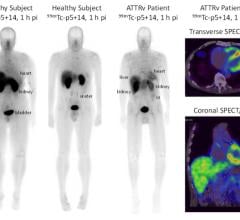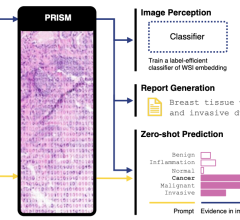April 29, 2013 — Navidea Biopharmaceuticals Inc. announced the peer-reviewed publication of results from a clinical trial of NAV4694 in healthy subjects and those with diagnosed forms of dementia. The trial assessed the performance of Navidea’s Fluorine-18 labeled amyloid imaging candidate, NAV4694, in a head-to-head comparison with the acknowledged benchmark, gold-standard amyloid imaging agent, 11C-labeled Pittsburgh Compound-B (PiB). Results demonstrated that NAV4694 displayed imaging characteristics nearly identical to those of PiB and the authors believe these results show that NAV4694 may be useful in the early and differential diagnosis of Alzheimer’s disease (AD). The study, “Head-to-Head Comparison of 11C-PiB and 18F-AZD4694 (NAV4694) for ?-Amyloid Imaging in Aging and Dementia,” was published in the current online edition of the Journal of Nuclear Medicine and will appear in the June print edition.
?-Amyloid imaging has the potential to play an increasingly important role in clinical practice as revised criteria for the diagnosis of probable AD allow for earlier diagnosis and therapeutic intervention. “For this to be a reality, clinicians will need access to reliable, practical and affordable imaging options,” said Professor Christopher Rowe, M.D., FRACP, director of the Department of Nuclear Medicine and Centre for PET at Austin Health, Melbourne, Australia and one of the authors. “This study suggests that NAV4694 images may be more easily and reliably read in clinical practice than other F-18 labeled PET tracers. By displaying imaging characteristics nearly identical to those of the gold standard, PiB, NAV4694 provides the same low background needed for earlier differential diagnosis while affording the practicality needed for production logistics.”
“With the ongoing movement toward earlier evaluation and treatment of cognitive impairment, it is of increasing importance for an improved diagnostic tool that can identify clinical dementia and cognitive impairment before it has fully developed,” commented Cornelia Reininger, M.D., Ph.D., Navidea’s senior vice president and chief medical officer. “These results add to our conviction that NAV4694, with its outstanding performance characteristics, may afford new opportunities to advance the early diagnosis of cognitive decline. We are very excited about the recent initiation of our Phase 2b study evaluating NAV4694 in the differentiation of mild cognitively impaired (MCI) subjects who are at risk of developing Alzheimer’s disease from those who are not, enabling the potential for early intervention with current and future treatments.”
For more information: www.navidea.com


 October 03, 2025
October 03, 2025 









